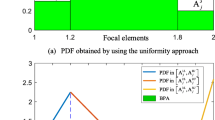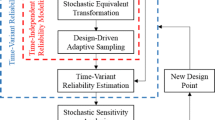Abstract
Only the worst-case scenario is considered in most studies when conducting reliability-based design optimization under hybrid uncertainties including epistemic uncertainty and aleatory uncertainty, which will result in waste of resources because of the excessive pursuit of higher reliability. In order to quantitatively balance resources and reliability restricted by the lower and upper bounds under hybrid uncertainties during the design stage, a novel flexible-constrained time-variant hybrid reliability-based design optimization model is proposed in this paper. The infeasible region pruning-based Kriging method is proposed to build surrogate models for hard constraints while a combination of Kriging and high-dimensional model representation is presented to build surrogate models for flexible constraints to improve the efficiency. In order to build the relationship between resources and reliability, the determination method of design preference parameter is provided. A metaheuristic framework is finally given to conduct the flexible-constrained time-variant hybrid reliability-based design optimization. Two examples are employed to illustrate and validate the effectiveness of the proposed method.










Similar content being viewed by others
References
Cheng K, Lu Z (2019) Time-variant reliability analysis based on high dimensional model representation. Reliab Eng Syst Saf 188:310–319
Hao P, Wang Y, Liu X, Wang B, Li G, Wang L (2017b) An efficient adaptive-loop method for non-probabilistic reliability-based design optimization. Comput Methods Appl Mech Eng 324:689–711
Hao P, Wang Y, Liu C, Wang B, Wu H (2017a) A novel non-probabilistic reliability-based design optimization algorithm using enhanced chaos control method. Comput Methods Appl Mech Eng 318:572–593
Hawchar L, El Soueidy C-P, Schoefs F (2018) Global kriging surrogate modeling for general time-variant reliability-based design optimization problems. Struct Multidisc Optim 58:955–968
Hu Z, Du X (2013) A sampling approach to extreme value distribution for time-dependent reliability analysis. J Mech Des 135:071003
Hu Z, Mahadevan S (2016) A single-loop kriging surrogate modeling for time-dependent reliability analysis. J Mech Des 138:061406
Huang Z, Qiu H, Zhao M, Cai X, Gao L (2015) An adaptive SVR-HDMR model for approximating high dimensional problems. Eng Comput 32:643–667
Huang ZL, Jiang C, Zhou YS, Zheng J, Long XY (2017) Reliability-based design optimization for problems with interval distribution parameters. Struct Multidisc Optim 55:513–528
Jiang C, Wei XP, Huang ZL, Liu J (2017a) An outcrossing rate model and its efficient calculation for time-dependent system reliability analysis. J Mech Des 139:041402
Jiang C, Fang T, Wang ZX, Wei XP, Huang ZL (2017b) A general solution framework for time-variant reliability based design optimization. Comput Methods Appl Mech Eng 323:330–352
Li J, Chen J (2019) Solving time-variant reliability-based design optimization by PSO-t-IRS: a methodology incorporating a particle swarm optimization algorithm and an enhanced instantaneous response surface. Reliab Eng Syst Saf 191:106580
Mourelatos ZP, Zhou J (2005) Reliability estimation and design with insufficient data based on possibility theory. AIAA J 43(8):1696
Rabitz H, Aliş ÖF (1999) General foundations of high-dimensional model representations. J Math Chem 25:197–233
Shi Y, Lu Z, Xu L, Zhou Y (2020a) Novel decoupling method for time-dependent reliability-based design optimization. Struct Multidisc Optim 61:507–524
Shi Y, Lu Z, Huang Z, Xu L, He R (2020b) Advanced solution strategies for time-dependent reliability based design optimization. Comput Methods Appl Mech Eng 364:112916
Suksuwan A, Spence SMJ (2018) Optimization of uncertain structures subject to stochastic wind loads under system-level first excursion constraints: a data-driven approach. Comput Struct 210:58–68
Tayyab Z, Zhang Y, Wang Z (2020) An efficient kriging based method for time-dependent reliability based robust design optimization via evolutionary algorithm. Comput Methods Appl Mech Eng 372:113386
Wang Z, Wang P (2012) A nested extreme response surface approach for time-dependent reliability-based design optimization. J Mech Des 134:121007
Wang Z, Huang HZ, Li Y, Pang Y, Xiao N (2012) An approach to system reliability analysis with fuzzy random variables. Mech Mach Theory 52:35–46
Wang C, Qiu Z, Xu M, Li Y (2017) Novel reliability-based optimization method for thermal structure with hybrid random, interval and fuzzy parameters. Appl Math Model 47:573–586
Wang L, Wang X, Wang R, Chen X (2016) Reliability-based design optimization under mixture of random, interval and convex uncertainties. Arch Appl Mech 86:1341–1367
Wang Z, Wang Z, Yu S, Cheng X (2019) Time-dependent concurrent reliability-based design optimization integrating the time-variant B-distance index. ASME J Mech Des 141(9):091403
Xia B, Lv H, Yu D, Jiang C (2015) Reliability-based design optimization of structural systems under hybrid probabilistic and interval model. Comput Struct 160:126–134
Yu S, Wang Z (2019) A general decoupling approach for time- and space-variant system reliability-based design optimization. Comput Methods Appl Mech Eng 357:112608
Yu S, Wang Z, Meng D (2018) Time-variant reliability assessment for multiple failure modes and temporal parameters. Struct Multidisc Optim 58(4):1705–1717
Zhang J, Xiao M, Gao L, Qiu H, Yang Z (2018) An improved two-stage framework of evidence-based design optimization. Struct Multidisc Optim 58:1673–1693
Zhao D, Yu S, Wang Z, Wu J (2021) A box moments approach for the time-variant hybrid reliability assessment. Struct Multidisc Optim 64:4045–4063
Acknowledgements
This work was supported by Sichuan Science and Technology Program under the Contract No. 2020JDJQ0036, and Natural Science Foundation of Sichuan under the Contract No. 2022NSFSC1941.
Funding
Funding was provided by Sichuan Province Science and Technology Program (2020JDJQ0036) and Natural Science Foundation of Sichuan (2022NSFSC1941).
Author information
Authors and Affiliations
Corresponding author
Ethics declarations
Conflict of interest
The authors declared that they have no conflicts of interest in this work. We declare that we do not have any commercial or associative interest that represents a conflict of interest in connection with the work submitted.
Replication of results
The results presented in this work are based on the flowchart in Fig. 2. In order to replicate the results, a series of Matlab code is provided as supplementary material. The attached Matlab file named as “main.m” and other function files can be utilized to build the model in Example 4.2, where The Kriging surrogate model is established by ooDACE toolbox. For replication of the results of other cases in the proposed work, information of input variables and random process can be modified in the corresponding source codes. The detailed instruction is in the function files.
Additional information
Responsible Editor: Yoojeong Noh
Publisher's Note
Springer Nature remains neutral with regard to jurisdictional claims in published maps and institutional affiliations.
Supplementary Information
Below is the link to the electronic supplementary material.
Rights and permissions
Springer Nature or its licensor (e.g. a society or other partner) holds exclusive rights to this article under a publishing agreement with the author(s) or other rightsholder(s); author self-archiving of the accepted manuscript version of this article is solely governed by the terms of such publishing agreement and applicable law.
About this article
Cite this article
Wang, Z., Zhao, D. & Guan, Y. Flexible-constrained time-variant hybrid reliability-based design optimization. Struct Multidisc Optim 66, 89 (2023). https://doi.org/10.1007/s00158-023-03550-8
Received:
Revised:
Accepted:
Published:
DOI: https://doi.org/10.1007/s00158-023-03550-8




